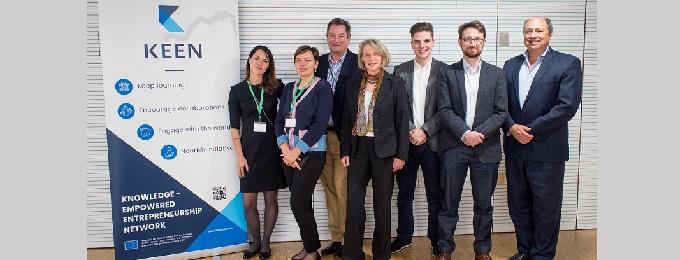The KEEN project supports Kaunas University of Technology in becoming an entrepreneurial R&I excellence hub. Also on board is the University of St Gallen.
The ‘Spreading Excellence and Widening Participation’ programme of Horizon 2020 (H2020), the current Research and Innovation (R&I) Framework Programme (FP) of the European Union (EU) aims to address disparities in R&I performance and FP participation across Europe. The core of the Widening package consists of Teaming, Twinning and ERA Chairs actions, for which specific eligibility conditions apply. Fifteen EU Member States (MS) and twelve Associated Countries are currently eligible for Widening support. The different actions of the Widening package directly address the causes of disparities in R&I performance, such as reduced access to international networks and lack of synergies between national research systems and the EU research landscape. In the long term, Widening actions aim to contribute to the removal of barriers to competitiveness, growth and jobs across Europe.
One of the launched Widening projects is KEEN, which stands for Knowledge-Empowered Entrepreneurship Network. KEEN’s objective is to position its Lithuanian consortium leader, Kaunas University of Technology (KTU) at the forefront of European research in entrepreneurship. Launched in September 2018 for a three-year duration, KEEN aims to improve KTU’s exploitation and dissemination of research outputs and to enhance the Lithuanian University’s ability to engage the public in its research and entrepreneurship awareness and understanding. KEEN further involves the University of St Gallen (Switzerland), Cranfield University (United Kingdom) and the Bergische Universität Wuppertal (Germany).
Professor Asta Pundzienė is KEEN’s head coordinator and works at the KTU’s School of Economics and Business, which already started to collaborate with University of St Gallen before the launch of KEEN. “After a successful application under the H2020 ‘Spreading Excellence and Widening Participation’ programme, the collaboration on entrepreneurship and innovation research was institutionalised within the KEEN Twinning project”, she says. H2020 Twinning actions focus on institutional networking and aim at strengthening a specific research field in an emerging institution in a Widening country through linking the institution with at least two internationally leading counterparts in Europe. Together, the KEEN consortium implements measures on entrepreneurship knowledge and research skills development, research collaboration and on the support of entrepreneurial initiatives. The consortium also jointly develops stakeholder integration strategies and grant applications for funding at the European level. The KEEN forum, a series of events and workshops regularly brings together business, academia, policy makers and society at KTU. “The KEEN forum is a powerful tool and a flagship series of events for knowledge transfer and the exploitation of entrepreneurial research by local start-ups and companies”, so Ieva Anužienė who is KEEN project coordinator at KTU. Overall, by engaging more than 20 researchers, including early-stage career from four partner universities, start-ups, enterprises and relevant innovation agencies, KEEN makes an important contribution to building an entrepreneurial ecosystem in Lithuania and Europe.
Every consortium member brings distinct assets into the network. “The strong research and entrepreneurial ecosystem at University of St Gallen provides KTU with a state of the art knowledge basis to develop entrepreneurial research capacities that have a high practical relevance”, so Professor Pundzienė. “Our Swiss partner also has a great expertise in strategic entrepreneurship and a strong tradition in related academic publishing.” This allows KTU researchers to benefit from best practices of academic paper writing and publishing. By the end of KEEN, a book entitled ‘Artificiality and Sustainability – An entrepreneurial perspective” will be published, edited and written by the network under the lead of KTU. However, the biggest challenge for KEEN is to assure fine orchestration of the busy agenda of the project – “Precise timing, communication with multiple stakeholders and careful preparations are key”, says Professor Asta Pundzienė. At the same time, it is also rewarding to see KEEN researchers collaborating on joint papers and to see the cooperation increasing through joint PhD training courses and workshops. The University of Wuppertal coordinates the collaboration of KEEN with leading scientific associations for entrepreneurship, innovation and SMEs in the German-speaking world. At Cranfield University, events devoted to the entrepreneurship training are organised which also attract Lithuanian investors.
Dr Dietmar Grichnik and Dr Charlotta Sirén, who are responsible for KEEN at University of St Gallen also see the Twinning project as a clear win for their institution. KEEN has enabled researchers from the Swiss side to expand their collaborative network and to enhance their ability to work across cultures while retaining a strong European perspective, Dr Sirén says. “Lithuania’s KTU has the potential to be the MIT of the Baltic region.” In the upcoming European FP for Research and Innovation, Horizon Europe (2021-2027), Widening actions will be continued under the ‘Widening Participation and Strengthening the European Research Area’ programme, receiving at least 3.3% of the final Horizon Europe budget which is still under negotiation. In this context, Professor Pundzienė is pleased to see that Horizon Europe Widening funding will not only be assigned to training and capacity building activities but also to the conduct of research. “This novelty will help us to produce the envisaged research outputs.” KEEN will run until August 2021, a period during which the consortium will focus amongst others on strengthening cooperation at PhD level by institutionalising existing programmes. Since two of the KEEN consortium members are based in non-EU countries, Professor Pundzienė hopes that there will be an agreement allowing Switzerland to become associated to Horizon Europe. “To sustain and build upon KEEN’s achievements, it is important that we can do that under the same conditions as before.”

